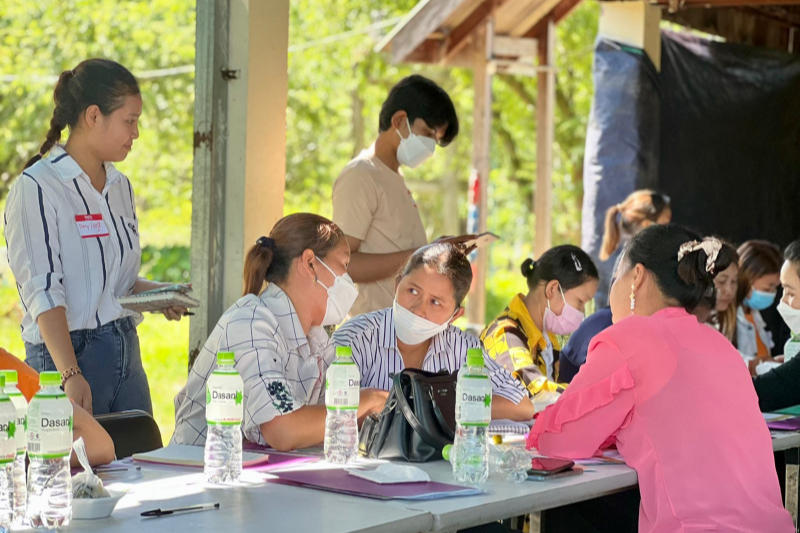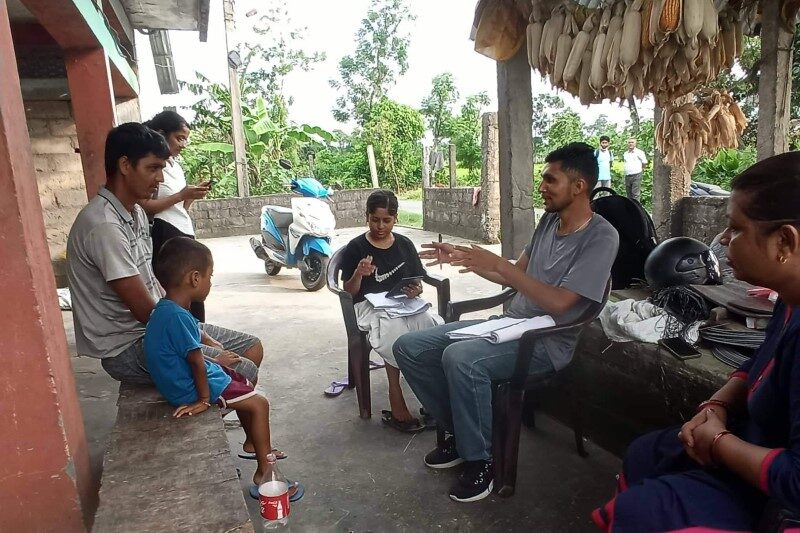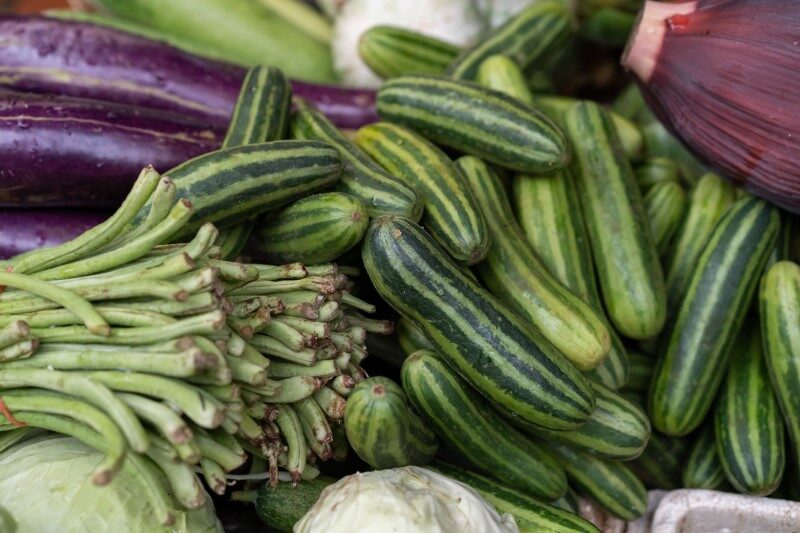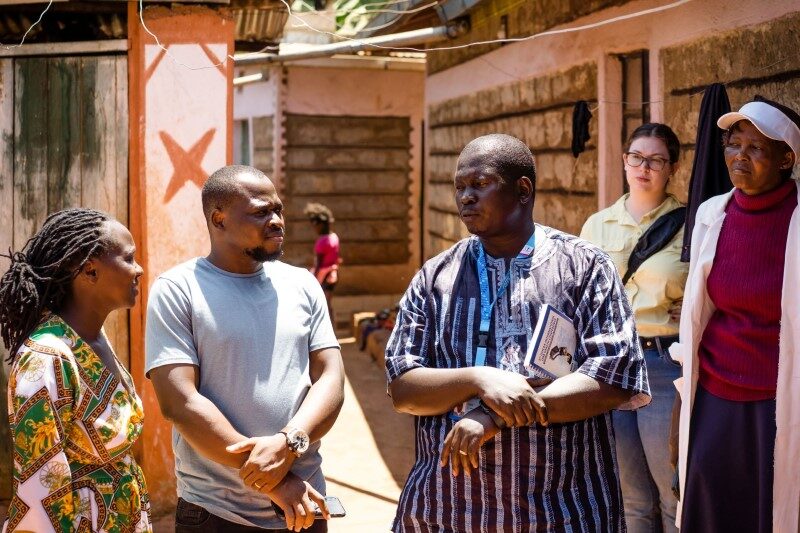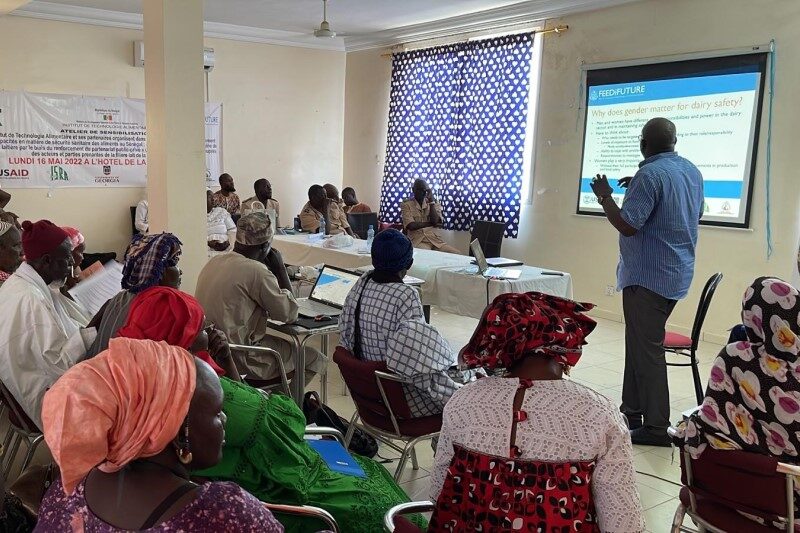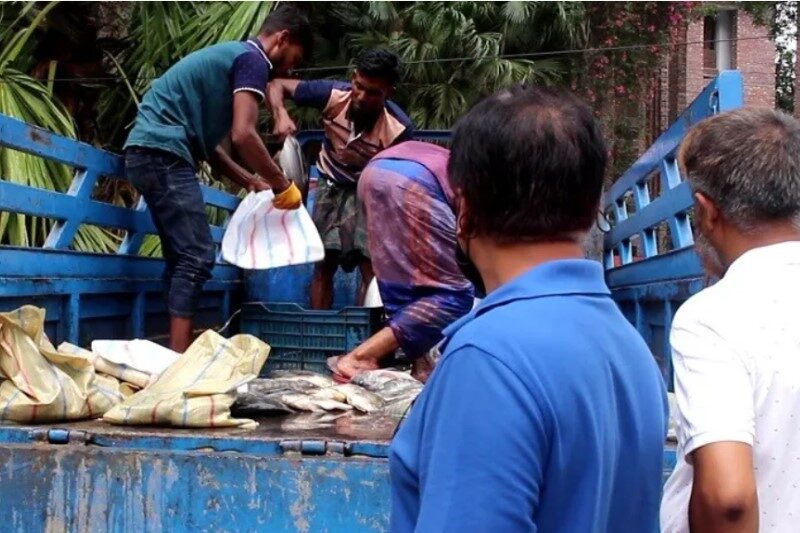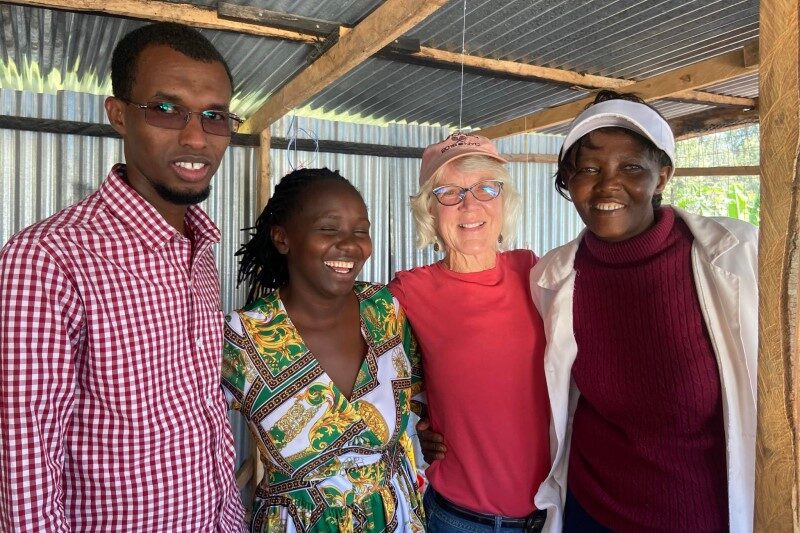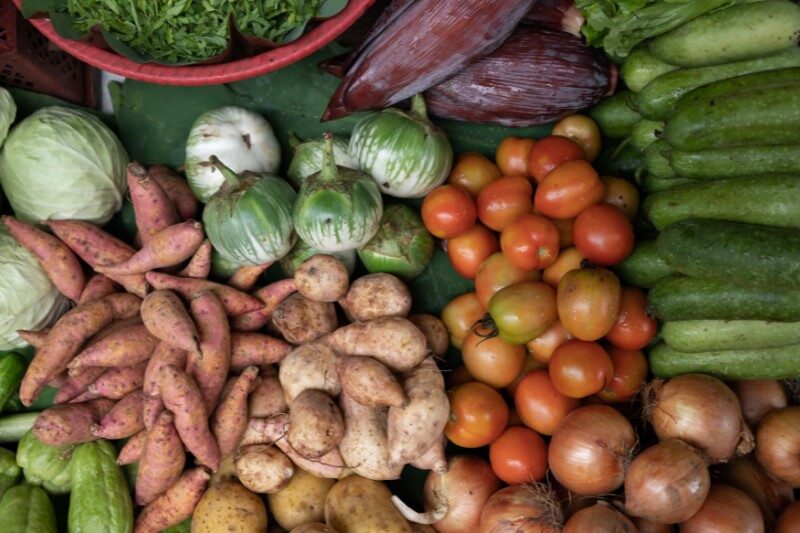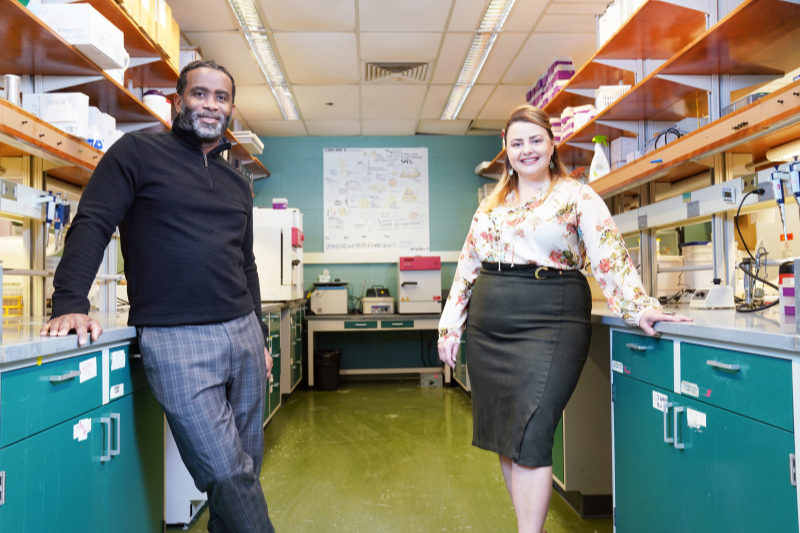Posted on October 10th, 2022 in Program Updates
In Cambodia, a multinational research team has piloted a leadership and food safety workshop that empowers female farmers to collaborate and take collective action to strengthen food safety in their communities.
In August, two dozen female vegetable farmers and staff members from Banteay Srei, a local nonprofit focused on women’s self-empowerment, participated in trainings held in the Cambodian provinces of Siem Reap and Battambang. During the day-long workshops, women worked together to identify their personal strengths and conduct risk assessments of the vegetable value chain, learning how their leadership and collective action can improve food safety in their communities.
Continue reading on Agrilinks
Posted on August 15th, 2022 in Program Updates
An international, multidisciplinary research team has launched a new project to improve the safety of fresh produce in Nepal by harnessing market-based approaches that integrate consumer and producer studies.
With a policy focus that prioritized food security and government investments in related areas, Nepal has experienced relatively higher productivity of some agricultural crops and lower poverty rates. Yet, 36% of children under five years old are chronically malnourished, and food production is only one side of the equation, says Aditya Khanal, associate professor of agricultural economics at Tennessee State University (TSU) and principal investigator (PI) on the new study funded by FSIL.
Continue reading on Agrilinks
While he now calls the state of Texas home, Madan Dey has roots in rural Bangladesh, where he grew up on the family farm. It was a small-scale operation that mainly produced rice, along with some fish and dairy. As a young boy, he witnessed firsthand his father, uncle and other relatives navigate the many challenges of running an agricultural business.
Today, as an agricultural economist, he performs experiments and analyses to better understand consumer behavior, which at first glance seems far removed from farming life. Yet, the heart of Dey’s work — to improve the livelihood of farmers around the world — can be traced back to his upbringing.
“I don’t like to do research for the sake of research. I like to do research that will help the stakeholder,” says Dey, professor of agricultural business and economics and chair of the Department of Agricultural Sciences at Texas State University. “I know the real pain of farming, so I try to help farmers.”
Continue reading on Agrilinks
Posted on June 28th, 2022 in Program Updates
Progress in food safety can stumble in the final mile: innovations to reduce the risk of foodborne illness are only effective if people are willing and able to adopt them. Social science tools can help fill this “implementation gap,” enabling researchers to understand the incentives and barriers to the adoption of new food safety practices. A recent course on research methods for gender-sensitive surveys, interviews and focus groups has equipped a cohort in Cambodia to help bridge the implementation gap in a vegetable food safety project funded by the Feed the Future Innovation Lab for Food Safety.
Continue reading on Agrilinks
Posted on June 22nd, 2022 in Program Updates
Poultry production systems worldwide are vulnerable to contamination with bacterial pathogens, such as non-typhoidal Salmonella, which is the leading cause of death from foodborne disease in Africa. Research grounded in locally led decision-making about priorities will be better positioned to generate sustainable, scalable food safety solutions. Leveraging this approach, a team of Kenya- and U.S.-based researchers held a risk ranking workshop in March, engaging female smallholder farmers in Kenya in prioritizing food safety interventions for rigorous evaluation.
Continue reading on Agrilinks
Posted on June 16th, 2022 in Program Updates
In late May, more than 40 dairy producers and processors gathered in Senegal’s Matam region, some having traveled up to 75 miles or with a child in tow. The participants, part of the country’s rapidly growing yet highly fragmented dairy supply chain, were attending a seminar on food safety fundamentals. It was one of three hosted in Senegal by a dairy safety project funded by the Feed the Future Innovation Lab for Food Safety.
Continue reading on Agrilinks
Posted on June 13th, 2022 in In the News
Translated from a story published by SHOBUJ BANGLADESH.
An auction was organized in the offices of the Agriculture, Economics, and Rural Sociology faculty of the Bangladesh Agricultural University to assess the value of food safety in fish and chicken in Bangladesh. The auction was organized by the Bangladesh Agricultural University, Dhaka University, and Texas State University together with financing from USAID. The research team organized this auction as a strategy to determine the market price of fish and chicken that are produced safely through this project.
Researchers stated that safely cultivated fish are attracting buyers and it looks like farmers will be able to sell fish that they produce at their desired price. At the beginning of the event, Dr. Madan Dey joined virtually from the United States. He said, “the purpose of this project is to raise fish and chicken while properly maintaining food safety and quality.” After this, project director Dr. Md. Saidur Rahman highlighted the agenda and the rules of the auction for the buyers present. He said, “fish cultivated under the project along with fish bought directly from the market are available here.”
He asked buyers to determine the price of the cultivated fish according to the market price. After that, two samples each of Tilapia and Pangas fish were shown to the buyers. Out of these two one was bought from the market and the other one was specially cultivated fish. At the first stage of the auction, the buyers were asked to determine the price of a fish that looked good based on its size and color. During this time buyers observed the fish in detail and submitted their maximum price in sealed envelopes.
In the second stage, buyers were asked to determine the price of specially cultivated fish based on information from the laboratory regarding the quality of the fish. During this time, Dr. K. H. M. Nazmul Hussein Nazir of the Department of Microbiology and Hygiene of the Bangladesh Agricultural University highlighted information from the laboratory for the buyers present and answered their various questions. Research shows that there are less bacteria present in safely cultivated fish. Sometimes there may even be no bacteria at all. There seem to be more bacteria present in unsafely cultivated fish.
After this, the results of the action were announced. The person who offered the highest price in the action was declared the winner. To purchase the fish, that person was asked to pay the second-highest price for it.
Teachers, office employees, and neighborhood businessmen including nearly 50 general buyers were present at the auction. Dr. Md. Akhtaruzzaman, a member of the research team, Dr. Samina Luthfa, an associate of the Faculty of Sociology of Dhaka University, and nearly 50 buyers were present. In stage one Dr. Md. Abul Haem from group “A” became the winner by offering 250 taka for specially cultivated Tilapia and 200 taka for Pangas fish. He had to pay the second-highest price of 200 taka for Tilapia and 150 taka for Pangas fish.
From the next group “B” Janab Md. Mohsin and Asif Mahmud were the winners for Tilapia and Pangas fish respectively and Abu Taher was the winner from group “C”. Zannatul Naima was the winner from the women’s group. Professor Dr. Chadeka Haque of group “A” was the winner after learning the results of the lab test. Abdullah Shafiq Md. Shahidul Islam and Asif Md. Hamza Talukdar from group “B” and Ariful Islam Babul, Abdul Kayem, Jainal Abedin from group “C” were the joint winners.
Dr. Md. Saidur Rahman, the principal co-coordinator of the project said that this project is being financed by the Feed the Future Food Safety Innovation lab. Through this project, producers are gaining an interest in cultivating fish free of bacteria and other hazards. The researchers also said that this will ensure health and safety through the use of safe fish.
Posted on June 6th, 2022 in Researcher Profiles
For over 25 years, Kathleen Colverson has facilitated interactive workshops all over the world, teaching sustainable practices in agricultural production, marketing, food safety and nutrition.
The common thread among all her trainings? They emphasize the importance of looking at food systems through the lens of gender. Before kicking off a session, she first scans her audience: how many men are there? How many women? Are they of different ages? Ethnicities?
Often, when training smallholder farmers in resource-limited communities, she’ll look out into the crowd to find only male faces staring back at her. Colverson pulls no punches in letting the audience know of her disappointment.
“I tell them, ‘I’ll see you next time, but you’d better bring your wife, your daughter or your sister, because I’m sure you’re not the only one doing the work, and I want to see more women and girls before I talk to you again,’” says Colverson, who currently serves as an associate research scientist in the Department of Animal Sciences at the University of Florida and senior gender scientist for the Feed the Future Innovation Lab for Livestock Systems.
Continue reading on Agrilinks
Posted on May 13th, 2022 in Program Updates
To boost the nutritional well-being of its population, Cambodia’s government has made a big push to increase the production and consumption of fresh produce throughout the country. For vegetables which are consumed uncooked, such as lettuce, preventing contamination from bacteria that cause foodborne illnesses is a food safety challenge. New research from a team of Cambodia- and U.S.-based scientists shows that distribution centers have a role to play in reducing foodborne illness.
Researchers funded by the Feed the Future Innovation Lab for Food Safety have been analyzing the fresh vegetable distribution chain in Cambodia — from farmers to distribution centers to fresh market sellers — to understand where contamination occurs and identify intervention strategies to strengthen food safety practices.
Continue reading on Agrilinks
Posted on April 27th, 2022 in Announcements
The Feed the Future Innovation Lab for Food Safety (FSIL), based at Purdue University and Cornell University and funded by the U.S. Agency for International Development (USAID), has launched two new food safety research projects in Nepal and Nigeria. The research partnerships, led by U.S. based Minority Serving Institutions (MSIs), will address policies and practices that reduce the burden of foodborne disease and malnutrition. The projects are the culmination of a competitive Request for Applications (RFA) process that recruited experts at MSIs to address gaps in food safety research in Africa and Asia.
Continue reading on Purdue College of Agriculture
